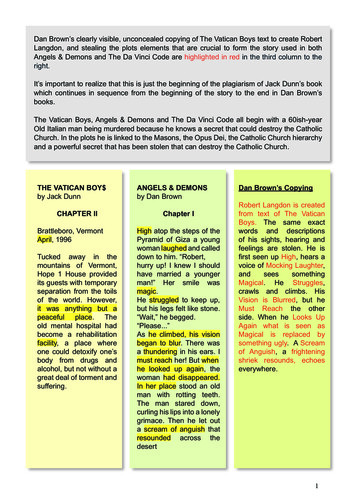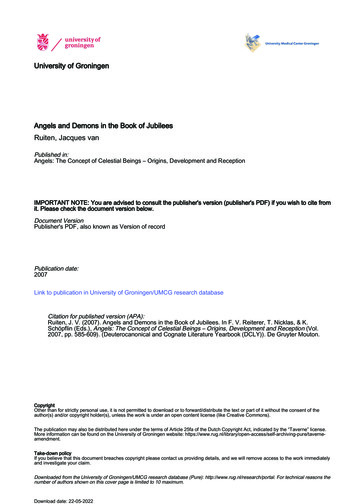
Transcription
Dan Brown’s clearly visible, unconcealed copying of The Vatican Boys text to create RobertLangdon, and stealing the plots elements that are crucial to form the story used in bothAngels & Demons and The Da Vinci Code are highlighted in red in the third column to theright.It’s important to realize that this is just the beginning of the plagiarism of Jack Dunn’s bookwhich continues in sequence from the beginning of the story to the end in Dan Brown’sbooks.The Vatican Boys, Angels & Demons and The Da Vinci Code all begin with a 60ish-yearOld Italian man being murdered because he knows a secret that could destroy the CatholicChurch. In the plots he is linked to the Masons, the Opus Dei, the Catholic Church hierarchyand a powerful secret that has been stolen that can destroy the Catholic Church.THE VATICAN BOY by Jack DunnCHAPTER IIBrattleboro, VermontApril, 1996Tucked away in themountains of Vermont,Hope 1 House providedits guests with temporaryseparation from the toilsof the world. However,it was anything but apeaceful place. Theold mental hospital hadbecome a rehabilitationfacility, a place whereone could detoxify one’sbody from drugs andalcohol, but not without agreat deal of torment andsuffering.ANGELS & DEMONSby Dan BrownChapter IHigh atop the steps of thePyramid of Giza a youngwoman laughed and calleddown to him. “Robert,hurry up! I knew I shouldhave married a youngerman!” Her smile wasmagic.He struggled to keep up,but his legs felt like stone.“Wait,” he begged.“Please.”As he climbed, his visionbegan to blur. There wasa thundering in his ears. Imust reach her! But whenhe looked up again, thewoman had disappeared.In her place stood an oldman with rotting teeth.The man stared down,curling his lips into a lonelygrimace. Then he let outa scream of anguish thatresounded across thedesertDan Brown’s CopyingRobert Langdon is createdfrom text of The VaticanBoys. The same exactwords and descriptionsof his sights, hearing andfeelings are stolen. He isfirst seen up High, hears avoice of Mocking Laughter,andseessomethingMagical. He Struggles,crawls and climbs. HisVision is Blurred, but heMust Reach the otherside. When he Looks UpAgain what is seen asMagical is replaced bysomething ugly. A Screamof Anguish, a frighteningshriek resounds, echoeseverywhere.1
For Catherine Turrell onthis unusually cold springday, the beauty of thegrounds, the grace of theold grey stone buildings,and the majestic sweepof the Green Mountains,softened by the lateafternoon light, contrastedsharply with the pain ofher withdrawal symptoms.In another frame of mind,the rural setting mightinspire inner peace andtranquility but now it onlysharpened her feelingsof hopelessness andanguish.Robert Langdon awokewith a start from hisnightmare. The phonebeside his bed was ringing.Dazed, he picked up thereceiver.“Hello?”“I’m looking for RobertLangdon,” a man’s voicesaid.Langdon sat up in hisempty bed and tried toclear his mind.“This. is Robert Langdon.”He squinted at his digitalclock. It was 5:18 A.M.“Imustseeyouimmediately.”“Who is this?”“My name is MaximilianKohler. I’m a discreteparticle physicist.”Robert Langdon awakeswith a start, gasping andDazed from the AwfulDream nightmare. Hetouches something besidehis bed. He is in an Emptybed or room. He tries toClear his Mind but feelssick, tries to sit up butcannot and lies backdown. He is awakened bythe Director of an Instituteorfacility,Maximilian(Maxwell) who has calledhim and wants to see him.He wants Langdon to cometo the facility immediatelyto talk about somethingUrgent.2
She was lovely. Thirty-fiveyears old, standing five feet-eleven-inchestall,with blonde hair, classicfeatures, and deep-setblue eyes, she had theelegantdemeanorofupper-class privilege, thekind that causes both menand women to stare andenvision themselves at herside. But her eyes were dullnow and her hair listless,her face was grey, her bodyweak. A deep tremor shookher and she turned awayfrom the window, watchingthe blue curtain drift backacross the small squaresof cold glass.Coming here had not beenher idea, but she couldn’tremember whose it was,and now she was too sickto leave. Lying on the stiffwhite sheets of the narrowbed, she pondered thequestion until a soothingveil of sleep dropped softlyover her.“A what?” Langdon couldbarely focus. “Are yousure you’ve got the rightLangdon?”“You’re a professor ofreligiousiconologyatHarvard University. You’vewritten three books onsymbology and-”“Do you know what time itis?”“I apologize. I havesomething you need tosee. I can’t discuss it onthe phone.”A knowing groan escapedLangdon’s lips. This hadhappened before. One ofthe perils of writingbooksaboutreligioussymbology was the callsfrom religious zealots whowanted him to confirm theirlatest sign from God. Lastmonth a stripper fromOklahoma had promisedLangdon the best sex of hislife if he would fly downand verify the authenticityof a cruciform that hadmagically appeared on herbed sheets. The Shroud ofTulsa, Langdon had calledit.“How did you get mynumber?” Langdon tried tobe polite, despite the hour.“On the Worldwide Web.The Director can’t discusswhat he wants Langdon tocome to the Institute for onthe phone. The Shroud ofTurin (Tulsa) is mentionedthat is the plot device inThe Vatican Boys. RobertLangdon asks the ‘oneexact same question’ thatThe Vatican Boys StephenHathawayaskstheDirector when he gets tothe Institute, “How did youget my number?3
Then the awful dreambegan again. She is onthe high bridge, aloneand afraid. It is snowingheavily and winds blowrelentlessly. She strugglesto cross the ricketyfoot bridge, hanging ontoslender frozen ropes, herhands torn and bleeding.A battered sign reads,Bridge of Dread. Seeingit, her strength and nervefail. Darkness engulfs her;she can see neither thebeginning nor the end,yet knows she is halfwayacross or nearly so, andmust reach the otherside. She crawls andscratches blindly alongthe worn boards, slippingon mounds of packedsnow and ice, and thenshe hears the voices--thedeep, mocking laughter ofthose who had fallen off—rising up from the abyss.She senses a presencecreeping up from behindand peers back into thedarkness.The site for your book.”Langdon frowned. He wasdamn sure his book’s sitedid not include his homephone number. The manwas obviously lying.“I need to see you,” thecaller insisted. “I’ll pay youwell.”Now Langdon was gettingmad. “I’m sorry, but I really-”“If you leave immediately,you can be here by-”“I’m not going anywhere!It’s five o’clock in themorning!” Langdon hungup and collapsed back inbed.He closed his eyes andtried to fall back asleep.It was no use. The dreamwas emblazoned in hismind.Reluctantly, he put on hisrobe and went downstairs.Robert Langdon wanderedbarefootthroughhisdeserted MassachusettsVictorianhomeandnursed his ritual insomniaremedy-a mug of steamingNestlé’s Quik. The Aprilmoon filtered through thebay windows and playedon the oriental carpetsLangdon’scolleaguesoften joked that his placelookedmore like an anthropologymuseum than a home. Hisshelves were packed withreligious artifacts fromaround the world-an ekuabafrom Ghana, a gold crossfrom Spain, a cycladic idolfrom the Aegean, and evena rare woven boccus fromBorneo, a young warrior’ssymbol of perpetual youth.It is April, in New Englandand the setting is country,rural. Robert Langdon isexperiencing the sameemotions and thoughtsas the character in TheVatican Boys. He isstaring into Darknessand the Awful Dream orNightmare is a reoccurringone. Looking into a mirroror at a bay window glasshe sees himself as apale, gray ‘Ghost of theirformer youthful self’. Theirconflicted feelings are thesame. TVB: In anotherframe of mind, the ruralsetting might inspire innerpeace and tranquility butnow it only sharpened herfeelings of hopelessnessand anguish. A&D: Thefirst hint of dawn wassifting through the birchtrees in his backyard, butthe view looked somehowdifferent this morning. Asan odd combination of fearand exhilaration settledover him.4
Dragging itself along, ahideous gorgon is approaching her. A wave ofpanic washes over herand she charges forward,only to slip uncontrollably. As she does, anotherpresence flies free aboveher, soaring effortlesslyinto the terrifying winds,and it whispers as it passes over her. It is a magicalwinged icon. She manages to make some headway and is reaching outwhen a frightening shriekpierces the air of the night.The icon has found itsmark! But when she turnsto look, the gorgon is stillalive, still stalking her.As Langdon sat on hisbrass Maharishi’s chestand savored the warmth ofthe chocolate, the bay window caught his reflection.The image was distortedand pale. like a ghost. Anaging ghost, hethought, cruelly remindedthat his youthful spirit wasliving in a mortal shell.Although not overly handsome in a classical sense,theforty-five-year-oldLangdon had what hisfemale colleagues referredto as an “erudite” appealwisps of gray in his thickbrown hair, probing blueeyes, an arrestingly deepvoice, and the strong, carefree smile of a collegiateathlete.A varsity diver in prepschool and college, Langdon still had the body of aswimmer, a toned, six-footphysique that he vigilantlymaintained with fifty laps aday in theuniversity pool.Langdon’s friends had always viewed him as a bit ofan enigma-a man caughtbetween centuries. Onweekends he could beseen lounging on the quadin blue jeans, discussingcomputer graphics orreligious history with students; other times he couldbe spotted in his Harristweed and paisley vest,photographed in the pagesof upscale art magazines atmuseum openings wherehe had been asked tolecture.hailed as the “lost art ofgood clean fun.”The physical descriptionsof Robert Langdon are thesame as The Vatican BoysStephen Hathaway. He is40ish, blue eyes, dark hair,handsome, classical, acommanding appearance,athletic, toned, jeans, with‘a carefree smile that women love’. There is a sceneof water and as described,a lost ‘good clean fun’.5
Catherineawoke,gasping, drenched withsweat. She wiped thewetness on her facewith the sleeve of hernightgown and shakilyswitched on the lampnext to her bed. The roomwas empty. She triedto focus on a seascapehanging lopsided on thewall opposite her, but assoon as she moved, herhead began to poundand nausea forced herback down. Making atremendous effort, shesteadied herself andsat up. Blood rushed toher head but she wasdetermined to remainupright. Slowly, she freedherself from the beddingtwisted around her feetand let the blanket slideto the floor.Although a tough teacherand strict disciplinarian,Langdon was the first toembrace what he hailed asthe “lost art of good cleanfun.” He relished recreationwithaninfectiousfanaticism that hadearned him a fraternalacceptance among hisstudents. His campusnickname-”The Dolphin”was a reference both tohis affable nature and hislegendary ability to dive intoa pool and outmaneuvertheentire opposing squad in awater polo match.As Langdon sat alone,absently gazing into thedarkness, the silence of hishome was shattered again,this time by the ring ofhis fax machine. Tooexhausted to be annoyed,Langdon forced a tiredchuckle.God’s people, he thought.Two thousand years ofwaiting for their Messiah,and they’re still persistentas hell.Wearily, he returned hisempty mug to the kitchenand walked slowly to hisoak-paneled study. Theincoming fax lay in the tray.Sighing, he scooped upthe paper and looked at it.Instantly, a wave ofnausea hit him.Text from Chapter 1 of TheVatican Boys is copieddescribing two thousandyears of waiting for theMessiah, Jesus Christ.Langdon is exhausted andhis thoughts are interruptedby the Director. A Wave ofNausea hits him, just likeNausea hits The VaticanBoys character.In The Vatican Boys it’s aWave of Panic and a Howlof Anguish and RobertLangdon has a Wave ofNausea and a Scream ofAnguish.6
Dr. David Maxwell waslistening in the hallwayout side. He had beencalled by the floor nursewhenthescreamingbegan. Knocking gentlyon her half-opened door,he entered and found hispatient huddled on thefloor near the bed. Slowly,he walked over to her.The room reeked of sweatand vomit.“Catherine?It’sDr.Maxwell.” He raised herchin and tried to find aspark in her eyes. “You’vehad a rather rough time ofit.”Catherine dropped herhead and the deep,wracking sobs began.The counselor helpedher onto the bed and puthis arm around her untilher sobbing became ahowl of anguish and thensubsided. Gently, hepushed the wet hair fromher eyes, then pulled upan armchair next to thebed and sat down in it.The image on the page wasthat of a human corpse. Thebody had been strippednaked, and its head hadbeentwisted,facingcompletely backward. Onthe victim’s chest was aterrible burn. The man hadbeen branded. imprintedwith a single word. It wasa word Langdon knew well.Very well. He staredat the ornate lettering indisbelief.“Illuminati,” he stammered,his heart pounding. It can’tbe. In slow motion, afraidof what he was about towitness, Langdon rotatedthe fax 180 degrees. Helooked at the word upsidedown.Instantly, the breath wentout of him. It was like hehad been hit by a truck.Barely able to believe hiseyes, he rotated the faxagain, reading the brandright-side up and thenupside down.“Illuminati,” he whispered.Stunned,Langdoncollapsed in a chair. Hesat a moment in utterbewilderment. Gradually,his eyeswere drawn to the blinkingred light on his fax machine.Whoever had sent thisfax was still on the line.waiting to talk. Langdongazed at the blinking light along time. Then, trembling,he picked up the receiver.Robert Langdon’s breathwent out of him just like TheVatican Boys charactergasping. The facsimileImage Robert Langdongets is of a human corpse,with his head twistedbackward. This is thereproduced(facsimile)murdered man characterfrom The Vatican Boyswho was found hangingunder a bridge in London.The use of the hangingman imagery ‘to set thestage’ for the story tounfold is identical.7
“How do you feel?” heasked, feeling slightlyfoolish for the triteness ofthe question.“Like I’m in hell,” shegasped.He looked down at thewet sheets and the vividpink scar circling herupper thigh.“You had the dreamagain?” he asked.“I don’t remember muchexcept feeling sick andscreaming. Was I yelling?What was I screamingabout?”Shelookedblankly at him.Do I have your attentionnow?” the man’s voicesaid when Langdon finallyanswered the line.“Yes, sir, you damn welldo. You want to explainyourself?”“I tried to tell you before.”The voice was rigid,mechanical.“I’maphysicist. I run a researchfacility.We’ve had a murder. Yousaw the body.”“How did you find me?”Langdon could barelyfocus. His mind was racingfrom the image on the fax.“I already told you. TheWorldwide Web. The sitefor your book, The Art ofthe Illuminati.”Langdon tried to gatherhis thoughts. His bookwas virtually unknown inmainstream literary circles,but it had developedquite a following on-line.Nonetheless, the caller’sclaim still made no sense.“Thatpage has no contactinformation,”Langdonchallenged. “I’m certain ofit.”There has been a murderand this is why the Directorof the Institute has calledand wants to talk to RobertLangdon. It’s the samereason Stephen Hathawayin The Vatican Boys iscalled by the Director tocome to the Institute. Thereis a discussion of how theircontact information wasobtained. The DirectortellsRobertLangdonand Stephen Hathawaythey have to come to theInstituteimmediately.When he gets there hefinds out the murderinvolves a beautiful, highlyintelligent 30ish womanwho knows secrets aboutthe murder that no oneelse does.8
“I’m not sure,” he said.Not wanting to discussthe dream yet, he wenton. “But I’d like you toattend a group session.Get yourself cleaned upand come down to themeeting room. I thinkyou’re ready for it and youneed it. It’s the last doordown the hall on the left.We start in an hour.”“’Who’s ‘we?’”“Me and several otherpatients. Don’t worry. I’lltake it slow.” He sensedher apprehension andtook her trembling handsinto his. “Catherine, it’stime to take the next step.”“I have people here at thelab very adept at extractinguser information from theWeb.”Langdon was skeptical.“Sounds like your labknows a lot about the Web.”“We should,” the man firedback. “We invented it.”Something in the man’svoice told Langdon he wasnot joking.“I must see you,” the callerinsisted. “This is not amatter we can discuss onthe phone. My lab is only anhour’s flight from Boston.”Langdon stood in thedim light of his study andanalyzed the fax in hishand. The image l find of thecentury, a decade of hisresearchconfirmed in a singlesymbol.“It’s urgent,” the voicepressured. Langdon’s eyeswere locked on the brand.Illuminati, he read overand over. His work hadalways been based onthe symbolic equivalent offossils-ancient documentsand historical hearsay-butthis image before him wastoday. Present tense. Hefelt like a paleontologistcoming face to face with aliving dinosaur.A plane will land at LoganAirport in Boston and anhour timeframe.AfterRobertLangdonandStephen Hathaway fly onthe plane they go directlyto meet with the Director athis Institute. They will talkabout the man’s murderand a female there whois ‘good with numbers’and knows why the manwas murdered and howit involves the CatholicChurch. Robert Langdonjust like The Vatican BoysStephen Hathaway knowsthat, ‘he had no choice’.9
“I’ve taken the liberty ofsending a plane for you,”the voice said. “It will be inBoston in twentyminutes.”Langdon felt his mouth godry. An hour’s flight.“Pleaseforgivemypresumption,” the voicesaid. “I need you here.”Langdon looked again atthe fax-an ancient mythconfirmed in black andwhite. The implicationswerefrightening.Hegazed absently throughthe bay window. The firsthint of dawn was siftingthrough the birch trees inhis backyard, but the viewlooked somehow differentthis morning. As an oddcombination of fear andexhilaration settled overhim, Langdon knew he hadno choice.“You win,” he said. “Tell mewhere to meet the plane.”10
The Largest Literary Crime in HistoryDan Brown’s Robert Langdon character was created by copying Jack Dunn’sbook The Vatican BoysCHAPTER IVCHAPTER 4Logan InternationalAirportLogan InternationalAirportJune 4Robert Langdon’s Saab900S tore out of theCallahan Tunnel andemerged on the east sideof Boston Harbor near theentrance to Logan Airport.Checking his directionsLangdon found AviationRoad and turned left pastthe old Eastern AirlinesBuilding. Three hundredyards down the accessroad a hangar loomedin the darkness. A largenumber “4”was paintedon it. He pulled into theparking lot and got out ofhis car.A round-faced man in ablue flight suit emergedfrom behind the building.“Robert Langdon?” hecalled.The man’s voice wasfriendly. He had an accentLangdon couldn’t place.“That’s me,” Langdonsaid, locking his car.“Perfect timing,” the mansaid. “I’ve just landed.Follow me, please.”Two planes, one fromParis and one fromLondon, landed at LoganInternational Airport inBoston within an hour ofeach other. Two men, onefrom each plane, met inthe baggage claim areaand then, talking quietly,walked to one of the carrental counters. JamieCole was the taller of thetwo—six foot three withfeatures too worn for his39 years. He was stocky,almost fat, and his bodyshowed signs of neglectand overeating. His shortreddish-brown hair wasmessy, his grey BrooksBrothers suit wrinkled,and his demeanor wasmost unfriendly.DanBrowncopiedCHAPTER IV of TheVatican Boys to make hisCHAPTER 4Two men meet up atLoganInternationalAirport in Boston becausethe Director has calledLangdon.Themenrendezvous at a terminal,the planes or planejust landed with perfecttiming. StephenHathawayis described and hisdescriptions re previouslycopied to become RobertLangdon’sdescriptions.He meets a stocky manin a suit in both stories.He checks directions. Thedemeanor of the stockyman is friendly or unfriendly.11
His friend of 20 years,Stephen Hathaway, had acommanding appearance.Thoughconsiderablyshorter and no youngerthan Jamie, he was avital, attractive man withdark hair and intenseblue eyes. His dress wascasual – jeans, sneakers,and a leather jacket—butthe jeans were tailoredand pressed, the sneakersnew and white, and theleather of his jacket was asoft suede. As always, hehad an engaging smile onhis face, the kind womenlove.As they circled the building,Langdon felt tense. He wasnot accustomed to crypticphone calls andsecret rendezvous withstrangers. Not knowingwhat to expect he haddonned his usual classroomattire-a pair of chinos, aturtleneck, and a Harristweed suit jacket. As theywalked, he thought aboutthe fax in his jacket pocket,still unable to believe theimage it depicted.The pilot seemed tosense Langdon’s anxiety.“Flying’s not a problem foryou, is it, sir?”“Not at all,” Langdonreplied. Branded corpsesare a problem for me.Flying I can handle.The man led Langdon thelength of the hangar. Theyrounded the corner ontothe runway.Langdon stopped dead inhis tracks and gaped atthe aircraft parked on thetarmac. “We’re riding inthat?”Stephen Hathaway has acommanding appearanceand the engaging smile onhis face women love. This isthe text copied to describeRobert Langdon in Angels& Demons Chapter 1 alongwith everything else in andaround the Dream scene.His dress is casual but neat,tailored and pressed. Thecharacter has an anxietyproblem about travel and itis described.12
Jamie found a cigarettemachine while Stephentook care of the rental cararrangements. The middleaged agent behind thecounter sighed, fluffed herhair, and lin-gered over herdirections to the parkinglot where they would findtheir car. She couldn’thelp but flirt with Stephen,although he gave her noencouragement.Outside, Stephen got intothe car on the driver’s side,knowing how much Jamiehated to drive, especiallyin large cities wherespeeding and traffic werethe norm. He noticed thecar phone hooked up onthe console. No phone hadbeen requested. Stephenpointed to it and put hisfingers to his lips. Jamiegrunted with annoyance ashe fastened his seat belt.The man grinned. “Like it?”Langdon stared a longmoment. “Like it? What thehell is it?”The craft before them wasenormous. It was vaguelyreminiscent of the spaceshuttle except that thetop had been shavedoff, leaving it perfectlyflat. Parked there on therunway, it resembled acolossalwedge. Langdon’s firstimpression was that hemust be dreaming. Thevehicle looked as airworthyas aBuick. The wings werepractically nonexistent-justtwo stubby fins on the rearof the fuselage. A pair ofdorsal guiders rose out ofthe aft section. The rest ofthe plane was hull-about200 feet from front toback-no windows, nothingbut hull.“Two hundred fifty thousandkilos fully fueled,” thepilot offered, like a fatherbragging about hisnewborn.“Runs on slush hydrogen.The shell’s a titaniummatrix with silicon carbidefibers. She packs a 20:1thrust/weight ratio; mostjets run at 7:1. The directormust be in one helluvaa hurry to see you. Hedoesn’t usually send thebig boy.”Once the directions arechecked and the man’sanxiety is explained thetwo men leave to go tothe Institute to meet upwith the Director. So thereason the men meet andtravel together is becausethe Director has called.A conventional jet isexplained in comparison tothe plane Robert Langdonis to ride in, the type thetwo men in The VaticanBoys landed in. The nextthing that happens is acharacter is ‘buckled in’ orhis seatbelt is fastened.13
Twenty minutes later,after a brief stop todisconnect the phonewires, they were travelingwest toward Vermont.Still concerned that theremight be a bug in the car,they were careful aboutwhat they said.“You look tired, Jamie!”“Things at the centerare hectic, old buddy.Life seems much morecomplicated than whenwe were younger.”The two laughed andrelaxed for a moment,remem beringtheclosenesstheyhadshared. They reminiscedaboutlessstressfultimes, when they wereyounger, opti mistic, andstill getting to know eachother.“Yeah. Remember thenight Catherine and Ifound you in the redlight district and endedup floating around on agondola with you and thatAustralian bimbo from theOld Sailor Hotel?”“Hey, it’s easy to get lostin the canals, Stephen,”Jamie grinned.“You stole the goddamnboat and fell in -the drink!Jesus, I thought youdrowned.“This thing flies?” Langdonsaid.The pilot smiled. “Oh yeah.”He led Langdon across thetarmac toward the plane.“Looks kind of startling, Iknow, but you better getused to it. In five years, allyou’ll see are these babiesHSCT’s-High Speed CivilTransports. Our lab’s oneof the first to own one.”Must be one hell of a lab,Langdon thought.“This one’s a prototype ofthe Boeing X-33,” the pilotcontinued, “but there aredozens of others-theNationalAeroSpacePlane, the Russians haveScramjet, the Brits haveHOTOL. The future’s here,it’sjust taking some time to getto the public sector. Youcan kiss conventional jetsgood-bye.”Langdon looked up warilyat the craft. “I think I’dprefer a conventional jet.”The pilot motioned up thegangplank. “This way,please,Mr.Langdon.Watch your step.”Minutes later, Langdon wasseated inside the emptycabin. The pilot buckledhim into the front row anddisappeared toward thefront of the aircraft.Life is more complicatedthan ‘when younger’. LikeRobert Langdon thoughtbefore, Stephen and Jamiereminisce about a placeof water when they wereyounger. Robert Langdonhas claustrophobia, -thevestige of a childhoodincident he had never quiteovercome. In The VaticanBoys the female characterhas childhood relatedclaustrophobia problemsand feels like she is in acocoon, closed spaces.14
Two hours later they weresitting in the small office ofDr. Maxwell in Brattleboro.He offered them coffee,which Jamie acceptedand Stephen declined.Maxwell closed the blindsbehind his desk againstthe afternoon sun. Theytalked briefly and vaguelyabout Catherine. Maxwellwas guarded about hisconcerns.“That’s a good question. Ireturned to the clinic aftera holiday. She had beenadmitted involuntarily overthe weekend.” He openedCatherine’s file. “Therewere some ID cards, butthere are many questionsconcerning her real identityand there is no record ofwho brought her in.”The cabin itself lookedsurprisingly like a widebody commercial airliner.The only exception wasthat ithad no windows, whichmade Langdon uneasy.He had been haunted hiswhole life by a mild case ofclaustrophobia-the vestigeof a childhood incident hehad never quite overcome.Langdon’s aversion toclosed spaces was by nomeans debilitating, but ithad always frustrated him.It manifested itself insubtle ways. He avoidedenclosedsportslikeracquetball or squash, andhe had gladly paid a smallfortune for his airy, highceilinged Victorian homeeven though economicalfaculty housing was readilyavailable. Langdon hadoftensuspectedhisattraction to the art worldas a young boy sprangfrom his love of museums’wide open spaces.The Character talks with Dr.Maxwell or Dr. Maximilian.The character is guardedabout his concerns, ‘notcomfortable’.Robert Langdon is goingto Switzerland. Catherinein The Vatican Boyswent to school as a girlin Switzerland and sheremembers this time howshe feels like she is in acocoon, a close space.An hour timeframe ismentioned again.There is a question of aperson’s real identity.15
“Don’t worry about thecosts. I’ll take care ofevery thing,”Stephendismissed the fee issue.“How did you get myname and number?” hewondered.“Icalledyou,Mr.Hathaway, because sherepeatedyournameand telephone numberfrequently during herdelirium. I wrote it down,although it was a reach. Itook a chance and got intouch with you becauseshe’s in a great deal oftrouble and needs a lot ofhelp.”The engines roared to lifebeneath him, sending adeep shudder through thehull. Langdon swallowedhard and waited. He felt theplane start taxiing. Pipedin country music beganplaying quietly overhead.A phone on the wall besidehim beeped twice. Langdonlifted the receiver.“Hello?”“ C o m f o r t a b l e ,Mr.Langdon?”“Not at all.”“Just relax. We’ll be therein an hour.”“And where exactly isthere?” Langdon asked,realizing he had no ideawhere he was headed.“Geneva,” the pilot replied,revving the engines. “Thelab’s in Geneva.”“Geneva,”Langdonrepeated, feeling a littlebetter. “Upstate New York.I’ve actually got family nearSeneca Lake. I wasn’taware Geneva had aphysics lab.”The pilot laughed. “NotGeneva,NewYork,Mr. Langdon. Geneva,Switzerland.”The word took a longmomenttoregister.“Switzerland?”Langdonfelt his pulse surge. “Ithought you said the labwas only an hour away!”“It is, Mr. Langdon.” Thepilot chuckled. “This planegoes Mach fifteen.”“How did you get mynumber?” Langdon asked.“I called you”, the Directorsaid.It was a reach for theDirector to get in touchwith Robert Langdon.The female at the Institute‘needs help’ and is goodwith numbers, the same inboth stories.Because she is good withnumbers, she can helpRobert Langdon find thepowerful secret missingand uncover why the manin the beginning of the storywas hanged to protect theCatholic Church.16
“Well, she has referredto many persons, but bydescription rather thanname. Mr. Hathawaywas the only person shenamed. She (Catherine)seems to be good withnumbers. Part of herramblings were filled withnumbers. Like I said, that’show I got your phonenumber. I questionedher about you, but shedoesn’t tell us muchabout her relationships.I suspect that you aremore than just a friendbecause of some of thethings she said aboutyou, even though she’sbeen mostly incoherent.I have gotten very littledirect information fromher. She is lucid now buthas not communicatedconsistently.”“Then, to your knowledge,we are the only oneswho know she is here?”Stephen leaned forwardwith a very direct lookintoMaxwell’seyes.The doctor pulled backas strong suspicionsabout the men beganto emerge. Who werethey? Why weren’t theymore concerned aboutCatherine’sstateofmind? Stephen sensedhis distrust and counteredit immediately.17
Later at the InstituteLater at the Institute“She’s has been involvedinseveralresearchprojects,” Stephen said.“Where has she worked?”Dr. Maxwell as
Angels & Demons and The Da Vinci Code are highlighted in red in the third column to the right. It’s important to realize that this is just the beginning of the plagiarism of Jack Dunn’s book which continues in sequence from th










